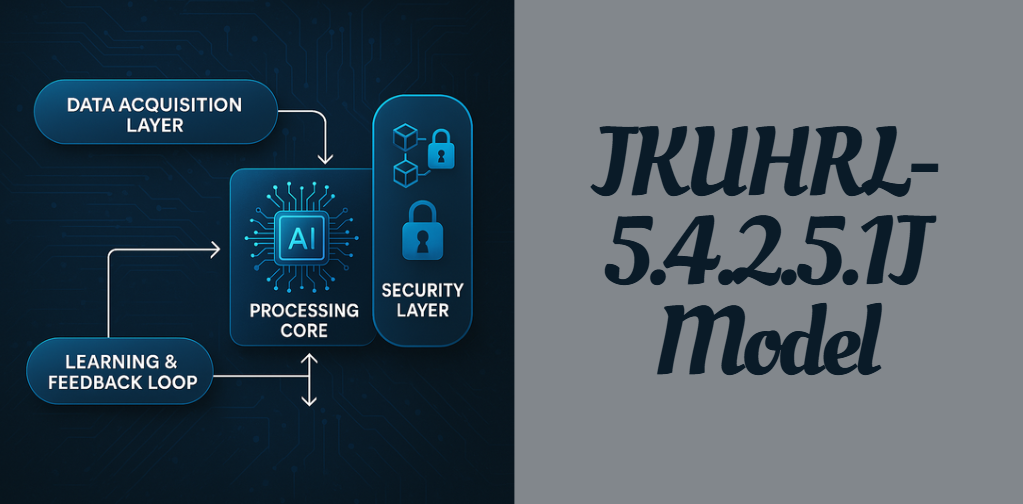The digital landscape is rapidly evolving, and with it comes the demand for next-generation data processing systems capable of delivering instantaneous insights and transforming complex datasets into actionable intelligence. At the forefront of this revolution lies the jkuhrl-5.4.2.5.1j model, a breakthrough framework that brings together cutting-edge artificial intelligence, machine learning, and even elements of quantum computing.
In this article, we present a comprehensive, data-backed analysis of the JKUHRL-5.4.2.5.1J model—a resource designed to equip industry experts, data professionals, and business strategists with the insights they need to stay ahead of the curve.
The JKUHRL-5.4.2.5.1J model stands as a testament to the power of innovation. It is not simply a tool; it is a robust system engineered to process large volumes of data in real time, deliver predictions with unprecedented accuracy, and integrate seamlessly with existing enterprise ecosystems. With its modular architecture and scalable design, this model is poised to redefine efficiency across diverse sectors—from finance and healthcare to manufacturing and smart cities.
What is the JKUHRL-5.4.2.5.1J Model?
The JKUHRL-5.4.2.5.1J model is an advanced data processing framework that harnesses the latest innovations in AI and machine learning to transform raw data into predictive, actionable insights. The unique nomenclature—”5.4.2.5.1J”—reflects its underlying modular architecture. Each numeric component corresponds to a specific stage of the data cycle, from acquisition and processing to learning and continuous improvement.
Developed to address the growing complexity and volume of modern data, the model offers real-time analytics capabilities along with enhanced security features. Its design enables rapid adaptability to new data patterns, ensuring that predictions remain accurate even as market conditions and user behavior evolve. In doing so, the model not only streamlines decision-making processes but also empowers organizations to optimize operations and reduce operational costs.
Architecture and Design
Modular Structure and Components
At the core of the JKUHRL-5.4.2.5.1J model is a modular structure that defines its superior functionality:
- Data Acquisition Layer:
This first layer is responsible for gathering data from diverse sources such as IoT devices, APIs, legacy systems, and cloud databases. It filters and preprocesses the data to ensure only high-quality information proceeds further. - Processing Core:
Utilizing advanced AI and machine learning algorithms, the processing core interprets the incoming data at lightning speed. This layer supports real-time analytics and leverages adaptive algorithms to continuously improve performance. - Learning and Feedback Loop:
Acting as the system’s intelligence hub, this module employs neural networks to derive insights and refine predictive models without constant human intervention. The feedback mechanism ensures the system evolves based on newly acquired data. - Security Layer:
To safeguard sensitive information, the model integrates blockchain-based encryption methods and multi-factor authentication protocols. This robust security framework ensures data integrity and compliance with stringent regulatory standards. - Integration and API Interface:
With its intuitive API suite, the JKUHRL-5.4.2.5.1J model can be effortlessly integrated into existing enterprise software, enhancing interoperability with ERP systems, CRM platforms, and other business applications.
A simplified table summarizing the architecture is presented below:
| Component | Function |
|---|---|
| Data Acquisition Layer | Collects and preprocesses data from multiple sources |
| Processing Core | Executes real-time analytics using AI and machine learning algorithms |
| Learning & Feedback Loop | Continuously refines predictions using self-learning neural network models |
| Security Layer | Implements blockchain encryption and multi-factor authentication for robust data security |
| Integration & API Interface | Provides seamless connectivity and integration with existing business systems |
Key Features and Benefits
Real-Time Data Processing
One of the JKUHRL-5.4.2.5.1J model’s most compelling features is its ability to process data in real time. In today’s fast-paced environment, delays can be costly; this model ensures information is available when it matters most, enabling swift responses to emerging trends or issues.
Advanced AI and Machine Learning
Unlike traditional data models that rely solely on historical datasets, this model leverages dynamic machine learning algorithms. It continuously improves its predictive capabilities by learning from new data inputs, effectively optimizing risk management, fraud detection, and market forecasting functions.
Uncompromised Security
The integration of blockchain-based security measures and strict access controls make the JKUHRL-5.4.2.5.1J model particularly suited for industries where data privacy is paramount. It ensures that all transactions and data exchanges are tamper-proof and compliant with standards such as HIPAA, GDPR, and ISO.
Scalability and Customization
Whether you are a startup or a multinational corporation, the model’s modular design and scalable infrastructure allow customization to suit specific business needs. Organizations can tailor functions such as the data acquisition layer or predictive analytics modules, ensuring that the system grows along with their evolving demands.
Real-World Applications and Use Cases
Finance Sector
In the finance industry, the JKUHRL-5.4.2.5.1J model is employed to revolutionize market analysis and risk management. Its real-time analytics capabilities facilitate:
- Market Forecasting: Leveraging predictive models to analyze trends and forecast stock movements.
- Fraud Detection: Identifying unusual patterns in financial transactions, thereby mitigating risks.
- Risk Management: Providing dynamic insights that help adjust investment strategies and manage exposure.
Healthcare
The model dramatically enhances healthcare operations by improving patient data management and predictive diagnostics. Hospitals and research institutions use it to:
- Predict Health Outcomes: Analyze patient records to foresee medical conditions before they worsen.
- Optimize Treatment Plans: Facilitate personalized medicine by integrating genetic data and historical trends.
- Real-Time Monitoring: Enable continuous patient monitoring for immediate response in critical care settings.
Manufacturing and Industrial Automation
Manufacturing plants are leveraging the model to streamline operations and boost productivity:
- Predictive Maintenance: Anticipate equipment failures by analyzing sensor data, thus reducing downtime.
- Supply Chain Optimization: Enhance logistics through real-time tracking and adaptive resource allocation.
- Quality Control: Utilize automated data analysis to ensure products meet stringent quality standards.
Smart Cities and IoT Integration
The emergence of smart cities relies heavily on efficient data processing. Municipalities and urban planners use the JKUHRL-5.4.2.5.1J model to:
- Manage Traffic Flow: Analyze real-time traffic data to reduce congestion and optimize public transport routes.
- Energy Distribution: Predict power consumption patterns to improve grid management and reduce wastage.
- Public Safety: Enhance surveillance systems and emergency response mechanisms through integrated data streams.
Implementation and Integration
Deployment Roadmap
Implementing the JKUHRL-5.4.2.5.1J model requires a structured approach that begins with a thorough system audit to assess current data flows and identify integration points. Organizations are advised to follow a phased deployment strategy, starting with pilot projects and scaling up gradually after proving the system’s value.
Integration with Existing Systems
The model’s robust API and seamless connectivity with modern cloud platforms such as AWS, Google Cloud, and Microsoft Azure ensure that integration with existing enterprise solutions is straightforward. Organizations can connect the JKUHRL-5.4.2.5.1J model to their current CRM, ERP, and legacy databases, thereby eliminating operational silos.
Training and Support
For smooth adoption, comprehensive training programs should be implemented. The user-friendly interface minimizes the learning curve, while ongoing support and regular system updates help maintain peak performance.
Future Trends and Roadmap
Advancements on the Horizon
As technology continues to evolve, future iterations of the JKUHRL-5.4.2.5.1J model are expected to incorporate deeper quantum computing integration to further accelerate data processing speeds. Enhanced natural language processing (NLP) capabilities and federated learning techniques are also on the roadmap, aimed at expanding the model’s adaptability and ensuring it remains at the cutting edge of data analytics.
Industry Impact and Long-Term Vision
The long-term vision for the JKUHRL-5.4.2.5.1J model is to serve as a universal backbone for intelligent data systems. By continuously refining its algorithms and expanding its integration with IoT devices, the model is set to redefine operational efficiency and decision-making across industries worldwide.
Expert Insights and Case Studies
Industry Expert Opinions
Dr. Amelia Carter, a renowned data scientist at Quantum Analytics Inc., remarks, “The JKUHRL-5.4.2.5.1J model is a game changer. Its ability to process data in real time with high precision is unparalleled. Enterprises that adopt this technology are poised to achieve unprecedented operational efficiencies and competitive advantages.”
Case Study: Transforming Financial Services
A leading financial institution integrated the JKUHRL-5.4.2.5.1J model into its trading systems. Over a six-month period, the institution reported a 30% reduction in response times to market fluctuations and a significant improvement in fraud detection rates, resulting in millions of dollars saved and enhanced customer trust.
Case Study: Enhancing Patient Outcomes in Healthcare
A major hospital network implemented the model to monitor patient vitals in real time. The deployment led to early detection of critical health conditions, improving patient outcomes and reducing emergency intervention rates. This not only bolstered the hospital’s reputation but also drove down operational costs significantly.
Frequently Asked Questions
1. How is the system maintained and updated after initial deployment?
After integration, the JKUHRL-5.4.2.5.1J model benefits from a proactive maintenance schedule that includes periodic performance reviews, automated system health diagnostics, and software updates. Organizations typically set up a dedicated support team or partner with the model’s vendor to implement these updates seamlessly, ensuring the system remains optimized and secure without extensive downtime.
2. What key performance indicators (KPIs) should organizations track to measure its success?
Beyond conventional metrics like processing speed and prediction accuracy, organizations are encouraged to monitor user adoption rates, integration downtime, system scalability progress, and cost savings achieved over time. Custom KPIs may also include data throughput, real-time response improvements, and the model’s impact on operational efficiency, allowing companies to tailor analytics to their unique business needs.
3. How does the model align with corporate sustainability and environmental initiatives?
The design of the JKUHRL-5.4.2.5.1J model emphasizes energy-efficient processing and optimized hardware utilization. By minimizing unnecessary computational overhead and integrating with eco-friendly data centers or cloud platforms, businesses can reduce their carbon footprint, making the model a suitable choice for organizations committed to sustainability practices.
4. Are there specialized training programs or community forums available for technical support and knowledge sharing?
Yes, many vendors and third-party providers offer tailored training modules, online tutorials, and certification courses specifically designed for the JKUHRL-5.4.2.5.1J model. In addition, a growing community of users, developers, and industry experts share best practices on dedicated forums, webinars, and technical conferences, providing ongoing support and insights to facilitate a smoother operational experience.
5. What measures can be taken to ensure a smooth cultural and operational transition when implementing this advanced system?
Successful integration goes beyond technical deployment. Leaders should focus on change management strategies that include early stakeholder involvement, cross-departmental collaboration, and clear communication of benefits. Providing hands-on training, establishing a dedicated transition team, and setting realistic milestones can help mitigate resistance and foster an environment where the new model is embraced across the organization.
Conclusion
The jkuhrl-5.4.2.5.1j model represents a pioneering leap in the field of data intelligence. It seamlessly fuses advanced AI, real-time analytics, and robust security into a modular and scalable system, making it indispensable for modern enterprises across various industries. From transformative applications in finance and healthcare to revolutionizing manufacturing and smart city initiatives, this model is redefining the standards for data processing and predictive analytics.
For organizations looking to gain a competitive edge and harness the power of intelligent data systems, adopting the JKUHRL-5.4.2.5.1J model is not just an opportunity—it is a strategic imperative. Embrace this revolutionary technology to transform your operations, drive efficiency, and secure your place at the forefront of the digital revolution.
Recommended Articles
Goldengatemax.shop#: Your Roadmap to Digital Trust and Security
Decoding gmrqordyfltk: Unraveling the Mystery and Harnessing Its Digital Power
Danny Kilcannon VarsityGaming: Redefining the Landscape of Competitive Gaming
Business Robthecoins Unveiled: In-Depth Analysis, Strategies and Case Studies
Exploring the Digital Frontier: Inside the Online World of SeveredBytes


